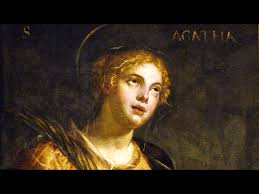HOMILY WEEK 05 01 – Year II
Living in Glorious Simplicity:
Memorial of St. Agatha, Virgin and Martyr
(1 Kg 8:1-13; Ps 132; Mk 6:53-56)
***********************************************
Perhaps you have heard the expression we should “live simply, so that others can simply live.”
Today’s liturgy invites us to emulate Jesus in a simple way of life and loving service.
The first reading is all about the glory and magnificence of the temple: King Solomon calls a grand assembly of leaders and priests. The ark of the covenant is brought to the Temple. Sacrifices innumerable were made, the stone tablets given to Moses were placed in the Holy of Holies, and the Glory of the Lord filled the Temple to such a degree the priests could not even enter.
A close reading of the gospel account from Mark reveals just the opposite – total and complete simplicity. Jesus, the Son of God, creator of this universe, humbly crosses the small Sea of Galilee in a boat with a band of very ordinary disciples. He then wanders from village and city to even farms in the country. People recognize him, however, and bring the sick to the marketplace so they could be healed by touching his garments. What a contrast from the pomp and glory of the temple sacrificial worship!
In the time of Ezekiel, who throughout his book bemoans the corruption in the temple worship and the lack of fidelity of the religious leaders, the glory of the Lord departed from the temple. Nor did it return when the second temple was blessed.
As the Messiah, Jesus was sent to restore the temple, gather all nations to himself, overcome the enemies of Israel, and rule as Lord over all creation. In the gospel, we see him doing just that. He gathers all nations to himself by going into pagan territory, the land of Gennesaret, and by going from town, village and farm, reaching out to the periphery. He overcomes the enemies of Israel by healing the sick and dispelling illness. Above all, he is the new Temple of God in his person. He is the glory of God that was to be restored to the temple.
That return of that temple glory happened at Pentecost, when the Spirit came back, not to the physical temple in Jerusalem, but to the band of believers huddled in the upper room, in the form of tongues of fire and “the sound of a rushing wind that filled the house.”
These were our ancestors in the faith. What is important for us to note here is that we are now the Temple of God, for the Holy Spirit, the glory of God, dwells within us. Unlike the thousands of bloody sacrifices offered on that day, we are to be a holy sacrifice ourselves by our lives of love. Our loving presence can bring healing to others.
We know that people Henri Nouwen, Dorothy Day and Catherine von Dougherty all brought hope and healing to those with whom they were in contact. They are examples to us of what it means to be a temple of the Holy Spirit.
 Today the church honours St. Agatha, who models radical faith for us. Known mainly through legend, she was martyred during the time of the Decian persecution (249-251). It is alleged she was sent to a brothel to force her to give up her faith. After she was tortured, the apostle Peter is said to have appeared and cured her. The following day she died in prison of new cruelties. Her intervention was credited with stilling the eruption of Mount Edna the year after her burial. In the Middle Ages, especially in southern Germany, bread, candles, fruit and letters were blessed in her name to ward off destruction by fire. She is considered a patron of miners, alpine guides and nurses, and is mentioned in Eucharistic Prayer I.
Today the church honours St. Agatha, who models radical faith for us. Known mainly through legend, she was martyred during the time of the Decian persecution (249-251). It is alleged she was sent to a brothel to force her to give up her faith. After she was tortured, the apostle Peter is said to have appeared and cured her. The following day she died in prison of new cruelties. Her intervention was credited with stilling the eruption of Mount Edna the year after her burial. In the Middle Ages, especially in southern Germany, bread, candles, fruit and letters were blessed in her name to ward off destruction by fire. She is considered a patron of miners, alpine guides and nurses, and is mentioned in Eucharistic Prayer I.
The Eucharist is our temple worship. We offer not the blood sacrifice of animals to God that does not change hearts, but the one and only true sacrifice of Jesus, his Son, whose love takes away the sins of the world.
May our celebration today help us to appreciate, and live, our reality as temples of the Holy Spirit, in glorious simplicity and loving service.



